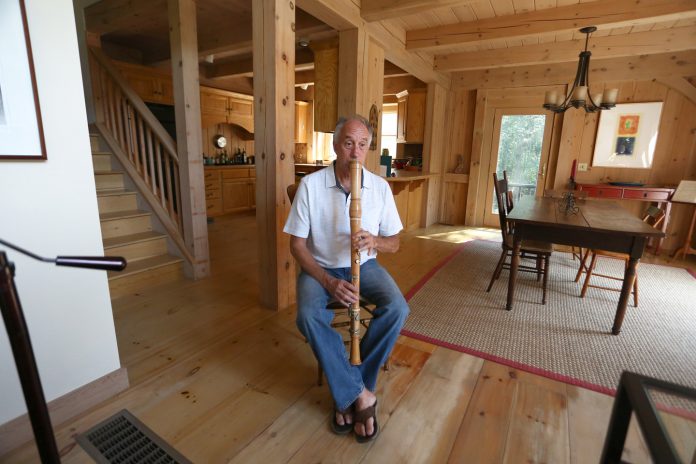
Musical ensembles come about a little bit the way love affairs arise: equal sprinkles of happenstance, desire, and a match created by inexplicable magic, however fleeting. Flautist Ed Merck of Lambert’s Cove has long pursued a passion for classical music, but he also digs jazz. Mr. Merck was keenly drawn to the music of Island jazz guitarist Eric Johnson.
“The best classical musicians often come from a jazz tradition,” Ed Merck explained over a recent lunch at his home (yes, the retired entrepreneur, sailor, author, and musician also cooks). “Years back, I conducted the Hartford Chamber Orchestra, and it was a plodding chore until the solo bassist took ill and was replaced by a jazz bassist,” Mr. Merck said. “The whole of the orchestra was transformed, every musician riding on his beat.” Mr. Merck went on to explain how jazz performers play from the front end of the beat, bringing rich textures to back-end-of-the-beat classical musicians.

Eric Johnson received a joint degree from the New England Conservatory in classical and jazz, then went on to teach at Berklee College of Music. When Mr. Merck and Mr. Johnson met on the Island and began to play together, a bromance developed between Mr. Merck’s recorder and Mr. Johnson’s acoustic guitar. The real fun occurred with medieval music, a sound created essentially by lute and flute as background for song, which musicians today can only approach as a form of jamming. Mr. Merck explained, “We only guess what music from the Middle Ages sounded like. There were no notes on pages, only lines for chords.” He and Mr. Johnson jammed, and they enjoyed the results.
A plan was formulated to stage a concert, but they needed a final piece for a perfect music trinity, someone who conjoined performing, narrative, and love of musical history. That person is another of our Island arts and culture treasures, Niki Patton. I once wrote about Ms. Patton, “She has the knack of always saying the coolest things.” She can also deliver on vocals with a force that can bring an entire body of listeners to rapt awareness. For the upcoming concert, aptly called “We Minstrels 3,” Ms. Patton will shine a light on the Dark Ages to the haunting music of 12th century Occitania (the land east of the Atlantic through France, then south to Spain); the breeding ground for Eleanor of Aquitaine’s Court of Love, with its troubadours and trobairitz (lady performers); then on to the violin, guitar, and keyboard instruments that gave us Renaissance music.
In her recent scholarly dip into medieval music, Ms. Patton developed an observable crush on a certain poet, singer, and carillonneur named Bernard de Ventadour. “Most people have never heard of him, but he was the 12th century equivalent of Bob Dylan,” Ms. Patton said, “an incredibly talented folksinger-songwriter whose music just blew everybody away. Everybody was playing his songs then, and they were so good that we’re still playing those songs and using his lyrics 900 years later.” (If you care to acquaint yourself with this rock star of yore, go to YouTube for a number of imagined stylings of Ventadour’s songs).
Ventadour, master of the classical form of courtly love poetry, sang of unrequited love, a love so profound and yet tragically unobtainable that the only recourse for the poet is to walk the earth and share his sexy grief — or, as some perceive of it, divine longing — with whoever might chance to stop and listen. Scholars — including Mr. Merck and Ms. Patton — have pondered who this proud, unyielding lady of Ventadour’s might have been. Many have posited it was Queen Eleanor herself, who brought Ventadour with her to her husband Henry II’s Plantagenet court in England (Katharine Hepburn played her in “The Lion in Winter,” with Peter O’Toole as the libidinous king). Later, Ventadour returned to Toulouse. Later still, he retreated to a monastery, and presumably died there.
Mr. Merck said of Ms. Patton’s narrative, and recitation of songs in both Occitane and English, “She’ll be taking a veil off the mystery and allowing us in.”
The trio will present a set of songs accompanied by instruments, then solo instruments, then instrumental sets. Mr. Merck said, “The new instruments of the Renaissance led to a revolution of music. The instruments could stand on their own, without the human voice adding emotion and romance.” The program will end with J.S. Bach transcriptions of three sarabands, as the jewel in the crown of evolving Western music.
“We Minstrels 3: Music and Poetry of Medieval and Renaissance Europe” will take place on Sunday, August 7, at 7:30 pm at the Unitarian Universalist Church in Vineyard Haven.
This article by Holly Nadler originally appeared on mvtimes.com.



